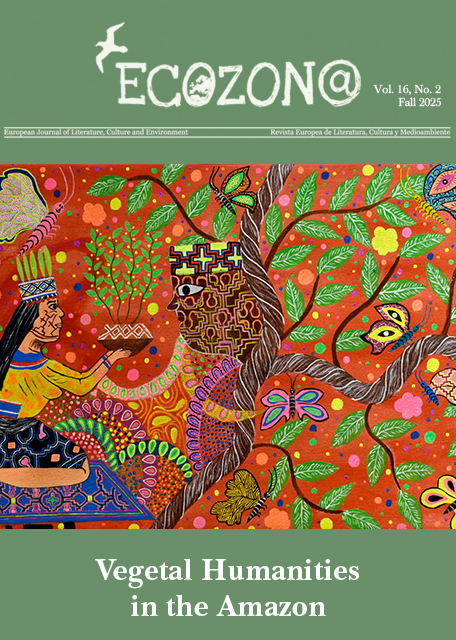Taboo Ecologies: Material and Lyric Dispossession in Anne Spencer’s Garden and Seed Catalogs
DOI:
https://doi.org/10.37536/ECOZONA.2023.14.1.4890Parole chiave:
Anne Spencer, garden and seed catalogs, antiblacknessAbstract
Harlem Renaissance poet and gardener Anne Spencer drew inspiration from both her garden and reading. In a poem entitled “Taboo,” Spencer described reading “garden and seed catalogs, Browning, Housman, Whitman […] oh anything…” and, in doing so, asserted the significance of her catalogs alongside literary works as inspiration for her poetry. The poem as a whole describes how Black women evade the Jim Crow South through covert activities like reading which for Spencer, importantly included garden and seed catalogs. Where Spencer’s poetry and garden have been the subject of academic research, her catalogs have yet to receive the same scholarly attention. This paper argues that by placing garden and seed catalogs in the same category of taboo reading as canonical poets and conventional forms of journalism, Spencer aligns the botanical with the literary as a form of resistance. The seed catalogs Spencer engaged with reveal a long history of racism in the cultivation and naming of garden plants. This paper examines the history of seed catalogs, showing how the naming of plants is a continuation of the racist logic of possession, reflected in the naming of plants by stripping the plant of its previous context and replacing it with the names of colonial scientists and racial slurs. Spencer’s poetic insistence on dispossession, the literal and metaphorical disembodiment and ejection from property, pushes against conceptions of ownership over the natural world in that it subverts the racist logic of possession. I contend that Anne Spencer actively intertwined histories by drawing on catalogs, poetry, and gardening to create new ecologies in the spaces between reading and writing, lyrical and material. The new ecology of Spencer’s garden far exceeds a place where plants are grown but rather becomes a space that blooms through the material, the lyrical, and social spaces, leaving behind instead a living archive of rebellion.
Downloads
##submission.downloads##
Pubblicato
Fascicolo
Sezione
Licenza
Authors who publish with this journal agree to the following terms:
a) Authors retain copyright and grant the journal right of first publication with the work simultaneously licensed under a Creative Commons Attribution License that allows others to share the work with an acknowledgement of the work's authorship and initial publication in this journal (CC BY-NC for articles and CC BY-NC-ND for creative work, unless author requests otherwise.
b) Authors are able to enter into separate, additional contractual arrangements for the non-exclusive distribution of the journal's published version of the work (e.g., post it to an institutional repository or publish it in a book), with an acknowledgement of its initial publication in this journal.
c) Authors are permitted and encouraged to post their work online (e.g., in institutional repositories or on their website) prior to and during the submission process, as it can lead to productive exchanges, as well as earlier and greater citation of published work (See The Effect of Open Access).










